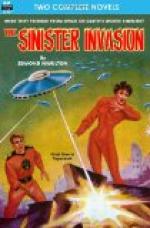Lockley thought of a decisive test. He grimaced.
“You want me to risk being a traitor! All right, what’s in it for me? What am I offered?”
The general shrugged, his eyes hardening. Vale spread out his hands. Sattell snorted. Jill moistened her lips. Lockley turned upon her.
“You want me to believe,” he said harshly. “What do you offer if I turn over the thing to these men you say are honest men and neither spies or traitors. What do you offer?”
She stared at him. Then she said quietly, “Nothing.”
Lockley hesitated once more, for a long instant. But that was the right answer. Nobody who’d been bought or bribed or frightened into being a traitor would have thought of it.
“That,” said Lockley, “by a strange coincidence happens to be my price.”
He ripped away a wire. He flung the queer combination of pocket radio and cheese and nutmeg graters to the general.
“I’ll explain later how it works,” he said wearily, “—if I haven’t made a mistake.”
* * * * *
After a suitable time the general came to him. Lockley was convinced, now. The reaction of the men who’d been guards and truck drivers and the like was conclusive. They regarded him with a certain cordial respect which was not the reaction of either traitors or invaders.
“We’ve been checking that little device, Lockley,” said the general happily. “It’s perfect for our purposes! So much better than a two-ton generator to interfere with and cancel the terror beams! Marvelous! And do you know what it means? With all the world believing we’ve been attacked from space, and with our great show of taking back Boulder Lake—”
“How will you manage that?” asked Lockley, without too much interest.
“The rocket,” said the general, beaming. “When troops start into the Park, the rocket takes off. It heads for empty space. And we explain that the aliens went away when they found their weapon useless and we started to get rough with them!”
“Oh,” said Lockley listlessly.
“But the really beautiful thing,” the general told him, “is your gadget! They can be made by millions. Ridiculously cheap, they tell me. Everybody in the world will want one, and we’ll pass them out. No government could stop that! Not even Russia! But—d’you see, Lockley?”
Lockley shook his head. He always had a tendency to look on the dark side of future events. The future did not look bright to him.
“Don’t you see?” demanded the general, chuckling. “They detonate explosives, those little gadgets! There’s no harm in that! Where explosives are used in industry you’ve only to make sure that nobody turns one on too close. In nine-tenths of the world, anyhow, civilians aren’t allowed to have guns. But think of the consequences there!”
Lockley was weary. He was dejected. The general grinned from ear to ear.




